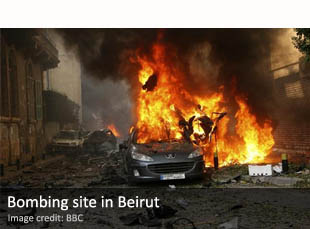Comment: The Significance of the Killing of Lebanon’s Security Chief
October 22, 2012 2 Comments
 By JOSEPH FITSANAKIS*| intelNews.org |
By JOSEPH FITSANAKIS*| intelNews.org |
Perhaps the only concrete reality reflected in last week’s assassination of Lebanon’s security chief is the confusion that continues to dominate Western reporting about Lebanese politics. On Friday, Lebanese capital Beirut experienced its most powerful bombing in nearly four years, when a car laden with explosives detonated killing at least eight and injured nearly 100 people. Among the dead was Brigadier General Wissam al-Hassan, head of the intelligence section of Lebanon’s national police force, known as the Internal Security Forces (ISF). Hassan, a career intelligence officer, was a Sunni Muslim strongly associated with Lebanon’s former Prime Minister Rafik Hariri. Hariri, who was assassinated in Beirut in 2005, was openly anti-Syrian, as was Hassan. This political identification is extremely telling in a country like Lebanon, which has existed under near-complete Syrian political and military domination for the past three-and-a-half decades. Throughout this period, the position of different actors on the Syrian question has been the core defining parameter in Lebanese politics. The same applies to Lebanese institutions. As one such institution, the ISF is widely perceived as strongly anti-Syrian, and is often considered the main rival of the Security Organ of Hezbollah, the Shiite paramilitary group that controls most of southern Lebanon.
Hassan’s strong anti-Syrian views have prompted some observers to point the finger at the Syrian government as the most likely culprit of last Friday’s assassination. The truth, however, is that nobody —in Lebanon or elsewhere— has the remotest idea who killed Hassan at this point. And anyone who suggests otherwise is either dangerously trivializing or blissfully unaware of the reality of Lebanon’s labyrinthine national politics. It is true that Friday’s bombing silenced a strong critic of Bashar al-Assad’s Syrian regime, who had an instrumental position inside the Lebanese government’s security establishment. But Hassan was hardly the country’s most important security official, and anything but unique in his anti-Syrian views within the context of the staunchly anti-Syrian ISF. Moreover, his assassination might have nothing to do with the ongoing Syrian Civil War, but might instead be connected with his recent investigation of Michel Samaha, a pro-Syrian former Lebanese government minister implicated in a series of bombings against Sunni opposition targets in Lebanon. To make this case even more complicated, many observers forget that Hassan was also the central figure behind Lebanon’s stunning counterintelligence offensive of recent years, which is widely credited with decimating some of Israel’s most active spy rings in southern and central Lebanon. Thus despite his consistent criticism of the Syrian regime of Bashar al-Assad, Hassan had few friends in Israeli intelligence circles. To this mix add the Iranian intelligence, which has been battling with the ISF for decades, as well as Hezbollah, whose leadership often views the ISF’s intelligence division as an outright enemy, and you can get a limited sense of the immense complexity of this case.
Another area of confusion concerns the riots that broke out in Beirut following Hassan’s funeral on Sunday. It is important to stress that the large crowds of Lebanese who were present at the funeral were not necessarily there to pay their respects to the dead man. Although Hassan was a senior official in the ISF, very few Lebanese knew his name prior to Friday. In fact, few —if any— ordinary Lebanese civilians had ever heard of Wissam al-Hassan prior to his high-profile assassination, just as few Americans today know the name of the Director of the Federal Bureau of Investigation’s National Security Branch. The crowds that descended on downtown Beirut on Sunday went there as participants in an act of defiance against those who planted the bomb that killed Hassan. These were primarily Sunni Muslims, who are largely supportive of the Free Syrian Army. On the other side of the divide, Lebanese Shiites, including Hezbollah and some of its Christian allies, tend to be staunch supporters of the Syrian government of Bashar al-Assad. The rioters who tried to storm the headquarters of the Lebanese government on Sunday afternoon believe that the Lebanese government should end its neutral stance on the Syrian Civil War and openly back the rebels. This is, of course, a highly predictable reaction to the bombing, so much so that it almost rules out the possibility that Damascus may have been behind Hassan’s assassination.
Ultimately, the view that last week’s bombing, and Hassan’s killing, may signify the internationalization of the Syrian Civil War is myopic. Politically and ideologically, Lebanon has been an integral part of Syria for decades, so much so that it would be strange if the Syrian crisis did not —sooner or later— engulf parts of Lebanon. In reality, the internationalization of the Syrian Civil War is already happening. This is reflected not only in the armies of committed Islamist fighters who are descending there to fight for their own ideological goals, but also in the American, Turkish, Saudi, Russian and Chinese military assistance that is flooding into the country. The situation in Syria is gradually beginning to resemble, not the Spanish Civil War, as some claim, but rather 1980s Angola —a gathering place for mercenaries, ideologues and Cold Warriors, all armed to the teeth and operating under the convenient protection of international apathy.
* Joseph Fitsanakis coordinates the Security and Intelligence Studies program at King College in the United States. He is Senior Editor of intelNews.org.







If only Lebanon had oil this would clarify who the Good Guys, Bad Guys, card-carrying Sponsors of Terrorism and purveyours of WMDs are. The rebels would have been made to sweep up the mess all those NATO bombs and missles left.
Instead complexities remain with neither Lebanon nor equally oiless Syria enjoying benefit of multi-billion dollar aerial bombing, joys of ground invasion, M1 tanks and oil drilling trucks under endless occupation.
Pete
the recently deceased may have been more involved in the misery of syria than first glance.